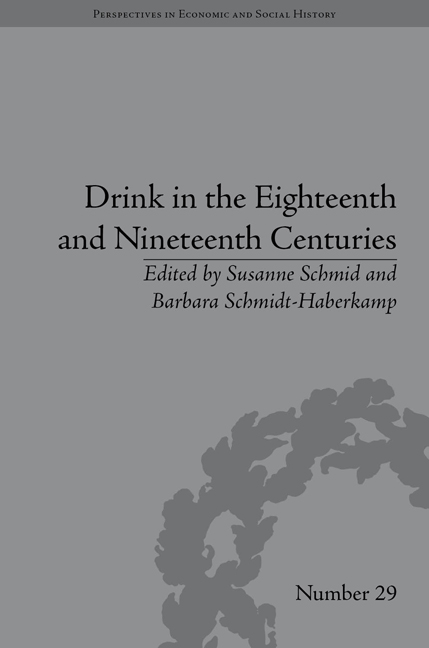Book contents
- Frontmatter
- CONTENTS
- Acknowledgements
- List of Contributors
- List of Figures and Tables
- Introduction
- Part I Ritual and Material Culture
- 1 Politics by Design: Consumption, Identity and Allegiance
- 2 Drinks, Domesticity and the Forging of an American Identity in Susan Warner's The Wide, Wide World (1850)
- Part II Institutions and Social Class
- Part III Temperance and the Misery of Alcohol
- Part IV Intoxication and Therapy
- Part V Case Studies: Rum, Cocoa and Magical Potions
- Notes
- Index
2 - Drinks, Domesticity and the Forging of an American Identity in Susan Warner's The Wide, Wide World (1850)
from Part I - Ritual and Material Culture
- Frontmatter
- CONTENTS
- Acknowledgements
- List of Contributors
- List of Figures and Tables
- Introduction
- Part I Ritual and Material Culture
- 1 Politics by Design: Consumption, Identity and Allegiance
- 2 Drinks, Domesticity and the Forging of an American Identity in Susan Warner's The Wide, Wide World (1850)
- Part II Institutions and Social Class
- Part III Temperance and the Misery of Alcohol
- Part IV Intoxication and Therapy
- Part V Case Studies: Rum, Cocoa and Magical Potions
- Notes
- Index
Summary
Introduction
Drinks and drinking not only sustain and nourish the body but, as a social practice, represent the symbolic orders of a particular culture in a specific historical setting. Drinks ‘signify’, as Roland Barthes put it with respect to food, because they obtain a symbolic value which moves well beyond their function as substance. Drinking practices enforce social structures and serve as symbolic acts in which gender, class, ethnic, regional or national identities are constituted. A ‘geography of drinks’, David Grigg claims, reveals a society's intra- and international political agendas. Drinks signify the value systems of a culture as well as the rituals necessary for constituting distinctive cultural identities; they often highlight competing ideologies. Literary texts in particular allow us to reconstruct the significance of drinking practices of earlier periods.
The following essay will investigate the meaning and function of drinks in Susan Warner's sentimental novel The Wide, Wide World. An analysis of the representation of tea, coffee and wine shows that Warner's text cannot merely be read as sentimental or domestic fiction but that it contributed to defining ‘Americanness’, an undertaking of fundamental importance for the period of the American Renaissance, in which Warner's novel was written. By looking at various representations of drinks in The Wide, Wide World, this chapter seeks to illustrate how Warner transfers the rhetoric and values of the domestic sphere into the arena of international politics and thus partakes in defining Americanness and in promoting American democracy.
- Type
- Chapter
- Information
- Drink in the Eighteenth and Nineteenth Centuries , pp. 23 - 34Publisher: Pickering & ChattoFirst published in: 2014



